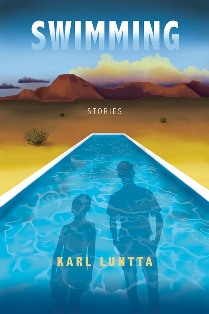Review — SWIMMING by Karl Luntta (Botswana)
 Swimming: Stories
Swimming: Stories
Karl Luntta (Botswana 1977-80; staff: Fiji, Solomon Islands, Western Samoa, Kiribati, Barbados)
Excelsior Editions/SUNY Press
September 2015
180 pages
$16.95 (paperback — from publisher), $12.38 (Kindle)
Reviewed by Ben East (Malawi 1996–98)
•
ONE THING IS CERTAIN for foreigners at work in much of Africa: the proverbs can be as colorful as they are vague, utilitarian as they are vexing. The truth can emerge — or remain obscured — with a single phrase applied in limitless ways. Truth, in these proverbs, lies in the eye of the beholder and not the object beheld.
This principle is at work in the eight stories of Karl Luntta’s Swimming, each of which churns beneath the surface with traces of hidden truth. Whether his characters are far removed from the world we know — like Maag, digging his own grave at the edge of the Kalahari — or are much closer to home, Luntta’s characters bristle with both confidence and confusion. From Boston’s suburbs to an overnight train deep inside Botswana, the darkened room of a children’s sleepover to the cracking ice of a winter’s pond, Luntta gives us protagonists struggling to assign meaning to the world around them.
The three stories set in Africa show Westerners at odds with an inverted notion of right and wrong. For them the inversion is both a blessing and a curse. The young American teacher Kevin Mahoney is “Excluded from certain culpabilities” because he’s a foreigner; but his ineptitude also makes him “A great source of entertainment throughout the village.” He’s appalled that his headmaster will be punished only lightly for savagely beating a woman with a garden hoe. But this situation, according to Mahoney’s Motswana colleague Peter Zimunya, is perfect: the headmaster “Humiliated himself in public. He is a buffoon. And that is her power.”
Mahoney, then, is left to puzzle over what exactly is meant by the proverb: “A fool returns to a virgin twice.” When his African friends misunderstand Mahoney’s English (“Get out of town!”), he sidesteps explanations by saying: “It’s an expression.” The Batswana are far more honest: “Do not look too deeply. Leave it. Proverbs are ephemeral by nature, as are virgins.”
Even beyond the continent Luntta’s characters struggle to comprehend the world around them.
“Cold on Ice” offers a look at one man coming to terms with his son — a ten-year-old violin prodigy — living his life in a wheelchair. Intending to leave the boy’s unused Bauer hockey skates by the side of a winter’s pond, this mourning father finds himself instead in the role of hero when an ice fisherman blasts a hole in the stillness. The fisherman’s carelessness reverberates beyond the cold morning, haunting the narrator into the following weeks. His wife’s conclusion offers one perspective: “This guy failed, he did a stupid thing, and he put both of your lives in danger. He thinks, or at least vaguely feels, that he’s less of a man for that one mistake . . ..” The images evoked by the writing offer another: “I didn’t stop, just skated, leaned low, pushed into the wind and sun, pushed my legs, pumped my arms, listened to my breathing and the sound of a distant violin singing over the empty pond like a mother’s call.” The image may not answer for the protagonist’s torment; but it does provide the beautiful coming-to-terms the narrator set out to find in the first place.
The remainder of these stories apply a similar mixture of clarity and loss, experience and innocence: a mistress whose lover lacks the courage of honesty; a child who witnesses “the act” for the first time; a father unable, then able, to reunite with his long-lost daughter. The collection, made up in equal parts of heartbreak and hope, contains, above all, good writing. Writing of the classic kind, with the subtle utility of a good African proverb.
•
Reviewer Ben East writes fiction and reviews at BenEastBooks.com. His debut novel, Two Pumps for the Body Man (New Pulp Press, 2016), is a satire of diplomacy on the front line of the War on Terror. Foreign Service assignments have taken him to Jeddah, Managua, Accra, Mexico City, and Washington DC with his wife Deepa (RPCV Malawi) and their two sons.
No comments yet.
Add your comment